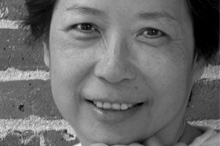Ending Hepatitis B in the AAPI Community
 Arline Loh is being honored as a Champion of Change for her efforts as an AAPI Women leader.
Arline Loh is being honored as a Champion of Change for her efforts as an AAPI Women leader.
I was infected with the Hepatitis B Virus (HBV) at birth by my mother. The mission of my work is to draw upon my own experiences with the disease to educate and inform the public about the dangers of the HBV and ways to prevent it. The Asian American and Pacific Islander (AAPI) population is disproportionately affected by HBV, and most contract HBV during birth. The majority of the AAPI population, especially those who are immigrants and first generation Americans, still lack awareness and knowledge of Hepatitis B such as its modes of transmission, prevention, disease progression, and current treatment options.
I launched my first Chinese/English bilingual Hepatitis B Patient Support Group in 2007 in the heart of Chinatown in Manhattan. It was soon followed by the second Hepatitis B Patient Support group at the Weill Cornell Medical Center in Manhattan. The groups met monthly and serviced a mixture of locals and visitors from surrounding states. The majority of these patients were new immigrants who often were non-documented, transient, not educated, and holding multiple jobs in order to make a living. Consequently, it was difficult for this group of patients to regularly attend group meetings, let alone follow-up in a Manhattan clinic for management of their condition. Most of the patients that were being treated in Manhattan discontinued treatment as soon as they were feeling better and never showed up.
Based on this experience, I developed an alternative outreach model for a program with a better return on investment and measurable outcome. Together with Dr. Tomoaki Kato, an abdominal transplant surgeon at Columbia Medical Center, we established the Health and Education for Asian Liver (H+EAL) outreach project in 2008.
For this initiative, we mobilized a team of 20 medical students from the five boroughs of New York City. Along with a hepatologist advisor, we developed a model to educate the at-risk population through their offspring who are generally better educated than their parents. This outreach and education was conducted through first or second generation AAPI high school students whose parents were either immigrants or first generation Asian Americans. The goal for this model was to encourage high school students to take home and share their newly acquired knowledge of Hepatitis B with their parents in hope that their parents, in turn, will actively get screened and receive appropriate medical care.
Our preliminary results for this alternative model were rather encouraging. The follow-up survey showed that 35% of the students spoke to their parents; 42% intend to talk to them in future, 24% encouraged them to get screened; and 25% encouraged them to be vaccinated. These findings demonstrate that the H+EAL project has been able to fulfill its goal of reaching a high percentage of the target population with hepatitis B awareness and education. Our future challenge for this model is to further develop more effective tools and guidance to increase their confidence level in talking to their parents.
Arline Loh is a co-founder of H+EAL (Health and Education for Asian Livers).
White House Blogs
- The White House Blog
- Middle Class Task Force
- Council of Economic Advisers
- Council on Environmental Quality
- Council on Women and Girls
- Office of Intergovernmental Affairs
- Office of Management and Budget
- Office of Public Engagement
- Office of Science & Tech Policy
- Office of Urban Affairs
- Open Government
- Faith and Neighborhood Partnerships
- Social Innovation and Civic Participation
- US Trade Representative
- Office National Drug Control Policy
categories
- AIDS Policy
- Alaska
- Blueprint for an America Built to Last
- Budget
- Civil Rights
- Defense
- Disabilities
- Economy
- Education
- Energy and Environment
- Equal Pay
- Ethics
- Faith Based
- Fiscal Responsibility
- Foreign Policy
- Grab Bag
- Health Care
- Homeland Security
- Immigration
- Innovation Fellows
- Inside the White House
- Middle Class Security
- Open Government
- Poverty
- Rural
- Seniors and Social Security
- Service
- Social Innovation
- State of the Union
- Taxes
- Technology
- Urban Policy
- Veterans
- Violence Prevention
- White House Internships
- Women
- Working Families
- Additional Issues

